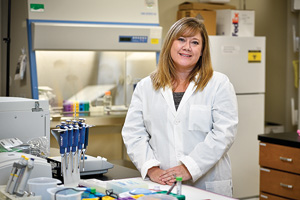Heart Health
Assistant professor of biology researches link between pollution and cardiovascular
health.
March 30, 2017
Amie Lund, assistant professor of biology, is researching the cardiovascular health effects of exposure to traffic-generated
pollution. She found it is associated with higher levels of oxidized "bad" cholesterol
in your body, which can contribute to the progression of cardiovascular disease. Amie Lund, assistant professor of biology, has found that exposure to traffic-generated
pollution has negative effects on cardiovascular health. She hopes her research will
lead to the design of drugs to help treat or prevent stroke and cardiovascular problems.
(Photo by Michael Clements)
Amie Lund, assistant professor of biology, has found that exposure to traffic-generated
pollution has negative effects on cardiovascular health. She hopes her research will
lead to the design of drugs to help treat or prevent stroke and cardiovascular problems.
(Photo by Michael Clements)
"We know heart attacks and strokes typically start with fatty plaque buildup," says Lund, who is hopeful her research will lead to improved therapeutic options to help treat or prevent stroke and cardiovascular problems, especially in regions that experience high levels of air pollution. "Now we want to understand how exposure to air pollution is making that plaque grow bigger in our blood vessels, which can lead to the onset of a heart attack, or if the plaque ruptures, it can result in a stroke."
Lund is experimenting to see how different types of air pollutants can change cell signaling patterns in the cardiovascular system on a molecular level, to better understand how they may contribute to diseases.